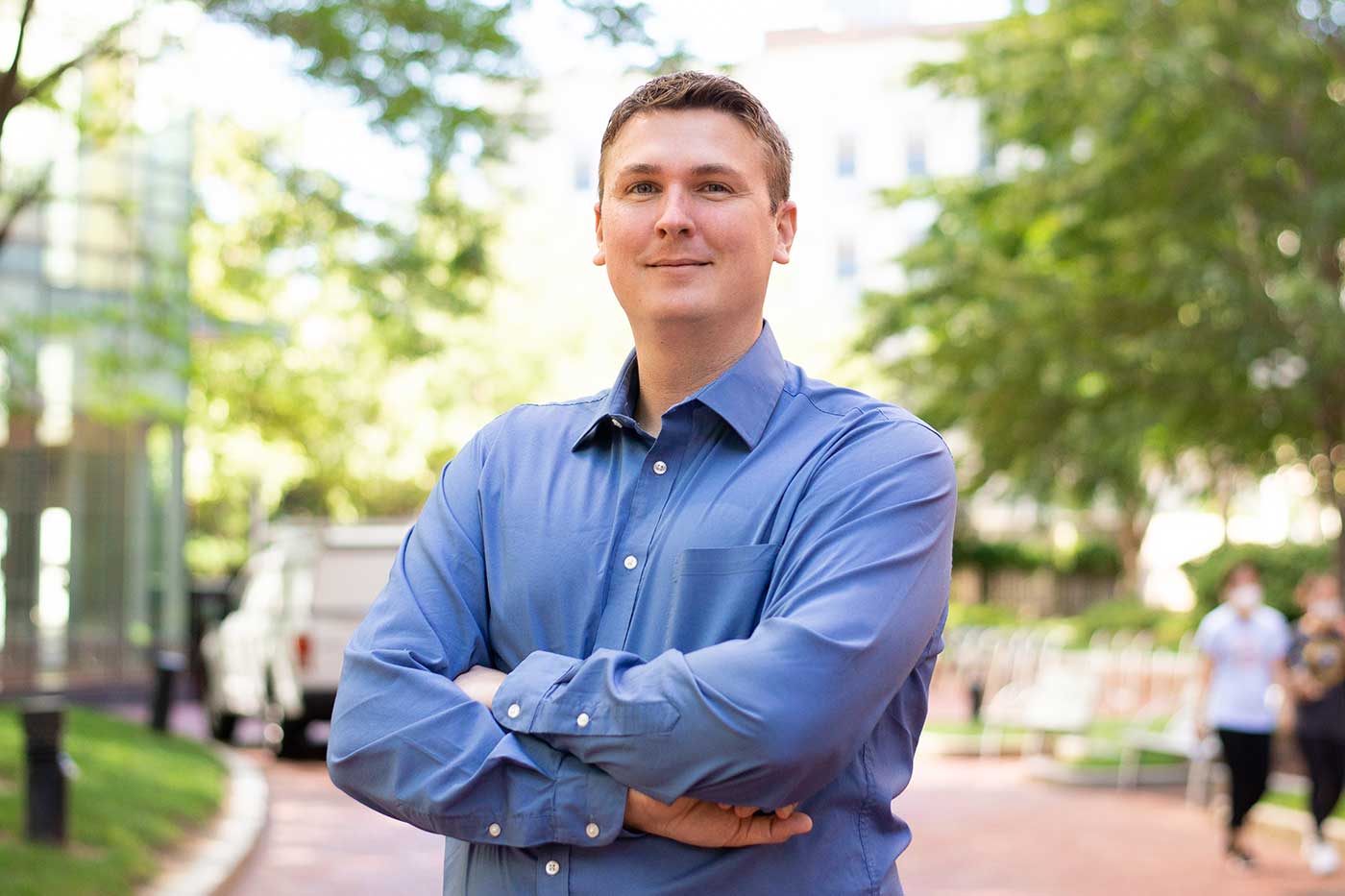Major Raynor to Dr. Raynor: how this Khoury PhD student navigated data viz and the Air Force
Author: Zorain Nizamani
Date: 12.05.23

In a world where the relentless pursuit of knowledge meets the unwavering call of duty, Justin Raynor has balanced the rigor of academia with the discipline of military service. An Air Force major and a Khoury College doctoral student who recently defended his thesis on cybersecurity and data visualization, Raynor is a steadfast officer who proves that the skies are not the limit when it comes to scholarship and service.
“I have been in the Air Force for almost 14 years now and I have held various positions, starting with the Air Force Research Laboratory where I worked with satellites and unmanned aerial vehicles,” Raynor says. “Then I did satellite command and control for the National Reconnaissance Office for four years.”
This service runs deep in Raynor’s blood, to the point that it seems more like a genetic trait — one he is proud to carry.
“Both of my parents served in the Air Force, and both got out around the time I was born,” Raynor remembers. “Both my grandfathers served in the military too. It was never pushed on me, but it was always something I wanted to do.”
Raynor has put similar dedication into his academics, first earning multiple undergraduate degrees in computer engineering and computer science.
“I always wanted to be a military engineer because I wanted not only to be a part of projects that civilians could not, but also to contribute to something greater than myself,” he explains. “My undergraduate education helped me achieve that.”
These projects included designing experiments to improve the optical detection capabilities of drone and satellite imaging systems, as well as designing user interfaces for mission crews onboard the Airborne Warning and Control Systems aircraft.
Raynor went on to earn his master’s degree from Northeastern University in electrical and computer engineering with a focus on electromagnetics, plasma, and optics — all while serving as a full-time officer. He then decided to pursue a doctorate from Khoury College in cybersecurity visualization design approaches under advisor Cody Dunne and within the Data Visualization Lab, focusing on improving visualization designs and research methodologies to accommodate challenges and risks in the cybersecurity realm. By improving the visual techniques used to present data, Raynor aims to bridge the gap between academia and industry, and to propose visualization solutions across the two domains. The common ground between his military background and doctorate, he says, makes the entire experience more rewarding.
“My work with operations, managing teams and seeing how things work in the Air Force has really driven how I have approached my PhD,” he says. “In visualization, we have the tendency to build really fancy tools with great graphics. But a lot of times, those tools don’t end up getting adopted or their adoption rates are very low … Many times, people can get too theoretical with their research, so practicality is something I have really taken to heart. My research is focused on what we can learn from military practitioners rather than pushing technology down on them.”
Raynor is firmly of the view that researchers need to work closely with military practitioners to understand how to design the tech. Design spaces is one such area of Raynor’s research, where the aim is to improve the design of processes and workflows, then efficaciously incorporate them within military organizations.
And he’s just as excited about his next assignment.
“I will be at Fort Meade in Maryland with the United States Cyber Command,” Raynor says. “As a senior major, I will be the focal point for the operations floor there, with my tasks revolving around managing people and operations.”
US Cyber Command is the nation’s unified combatant command for the cyberspace domain. Its mission is to direct, synchronize, and coordinate cyberspace planning and operations, and to defend and advance national interests in collaboration with domestic and international partners.
But beyond his busy professional and academic life, Raynor’s experiences have taught him how to balance a fast-paced, technology-laden career with his family life. He also believes it is equally important to give back to community — addressing pressing social issues and fostering a sense of purpose, belonging and personal growth. Raynor believes that his family strengthens him every day, which allows him to continue doing what he does best.
“My wife is a board member for a community theatre organization in Massachusetts while I’ve been busy earning a PhD, and I had the opportunity to be on the board for a conservation organization out of Colorado,” he said. “We have four kids too, so family life is equally important. We go to national parks and camp out. Balance in life is imperative.”
It’s that balance that has led Raynor through his journey as a scholar–officer, and it’s that balance that will drive him forward — newly earned doctorate in hand.